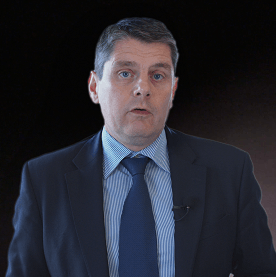How have the events of 2024 left the European economies?
Janet Wilkinson: The landscape has shifted this year. Political and policy transitions in the U.S., E.U., U.K., and France, along with the ripple effects of heightened global geopolitical volatility, are reshaping the economic agenda with profound implications for markets, businesses and investors.
Peter Schaffrik: Growth in 2024 was better than expected. The firmness of the labor market is really one of the key central pillars – not only different to past hiking cycles, but with a clear structural element that might well drive us going into 2025.
Of course, inflation has also come down. That enabled the central banks to put a cutting cycle into motion.
Without any major deterioration in the labor market, which we do not foresee, it’s very unlikely that we’ll get a recession.
“Without any major deterioration in the labor market, which we do not foresee, it’s very unlikely that we’ll get a recession.”
Peter Schaffrik, Chief European Macro Strategist
What are the growth prospects for 2025?
Schaffrik: In the euro area as well as in the U.K., we're thinking about growth in the range of 1 to 1.5% – positive, but not stellar.
Real disposable income has gone up, but consumption has not. The question is whether that changes going forward. We have seen some tentative changes, but there's plenty of headwinds.
Cathal Kennedy: The domestically generated parts of the inflation basket, most noticeably services inflation, have yet to convincingly move downwards in either the U.K. or the euro area.
We think that the central dilemma is the productivity growth backdrop, which post-pandemic has gone from being weak to being either non-existent or negative.
What does that mean for rates?
Schaffrik: The ECB has communicated that they want to return interest rates to a neutral level. But that's a very elusive concept.
We have pencilled into our forecast 2.25%. That’s nearly two cuts above where the market sees it, making us a bit of an outlier.
Kennedy: The Bank of England is now advocating a much more gradual, cautious approach to the current cutting cycle, essentially because the October budget loosens fiscal policy in the near term.
The U.K. government has front-loaded day-to-day spending, creating fiscal stimulus. When taxes kick in from April, they fall mainly on employers in the form of a payroll tax. There’s some evidence that firms, particularly in the service sector, might look at employment as the way to pass that on.
What the bank is interested in is that interaction of that near-term fiscal stimulus with the changing behavior of employers.
“The Bank of England is interested in is the interaction of near-term fiscal stimulus with the changing behavior of employers.”
Cathal Kennedy, Senior U.K. Economist
How does political turmoil play into economic fortunes?
Schaffrik: What we’ve seen in France recently highlights how wide budget deficits and high debt levels can potentially move markets. On the other hand, you have the German budget that is very tight, and the government even fell over the big question about whether to widen the budget and support the economy. I'm pretty confident that after the elections, what we'll get is a different fiscal position out of the largest economy in the euro area, where we'll probably see support programs to stimulate the economy.
There is an increased focus now on using the EU's budget, or some kind of SPV, to specifically target military and security spending, which is probably something that the U.S. will push.
So the fiscal loosening we’ve already seen in the U.K. is going to be a key theme for 2025 in the euro area as well – in part voluntarily, but in part forced by the new U.S. administration.
“The fiscal loosening we’ve already seen in the U.K. is going to be a key theme for 2025 in the euro area as well.”
Peter Schaffrik, Chief European Macro Strategist
What are the implications if trade tariffs are imposed by the new U.S. administration?
Schaffrik: Tariffs, by and large, are negative for Europe, no doubt about that. The question is whether they are also inflationary.
In one scenario, U.S. introduction of tariffs on China could see more Chinese products come into Europe, maybe at a discounted price, which is disinflationary. But there's obviously an alternative scenario where the U.S. strongarms the Europeans to introduce restrictions against China themselves.
We assume that we will get some kind of tariffs. It's not entirely clear what magnitude and what sequence they will take. On balance, they're probably going to be negative for growth, and at least initially, inflationary.
What are investors’ current perspectives?
Schaffrik: Most of our clients are expecting a relatively negative 2025 and therefore quite a lot of rate cuts.
If we are right, and inflation remains a bit more sticky in all European economies, the ECB is likely to cut less than expected and pause at 2.25% whilst the BoE is likely to remain in the slow lane, ending the cutting cycle near 3.75%. If you then extend that into the longer end of the yield curve, we find it difficult to see how duration can perform this year. We recommend short-duration assets in pretty much all markets that we look at.
If you look at ultra-long dated assets, the issue of debt sustainability and widened fiscal policy that we spoke about earlier might be an additional burden for them.
Wilkinson: At senior business levels, geopolitical risks and the uncertainty they bring are top of mind. We all know that the institutional asset management market in the U.K. and Europe, and globally, is under immense cost pressure, and there's a strong move to passive funds. The uncertainty around growth in the markets puts even greater pressure on this.
To end on a bit of a high, there's a really strong outlook for M&A and associated deal activity, and for corporate credit, where yields are still high.
“There's a really strong outlook for M&A and associated deal activity, and for corporate credit, where yields are still high.”
Janet Wilkinson, Managing Director, Head of Global Markets Flow Sales, EMEA


